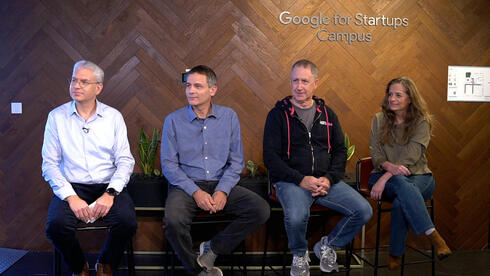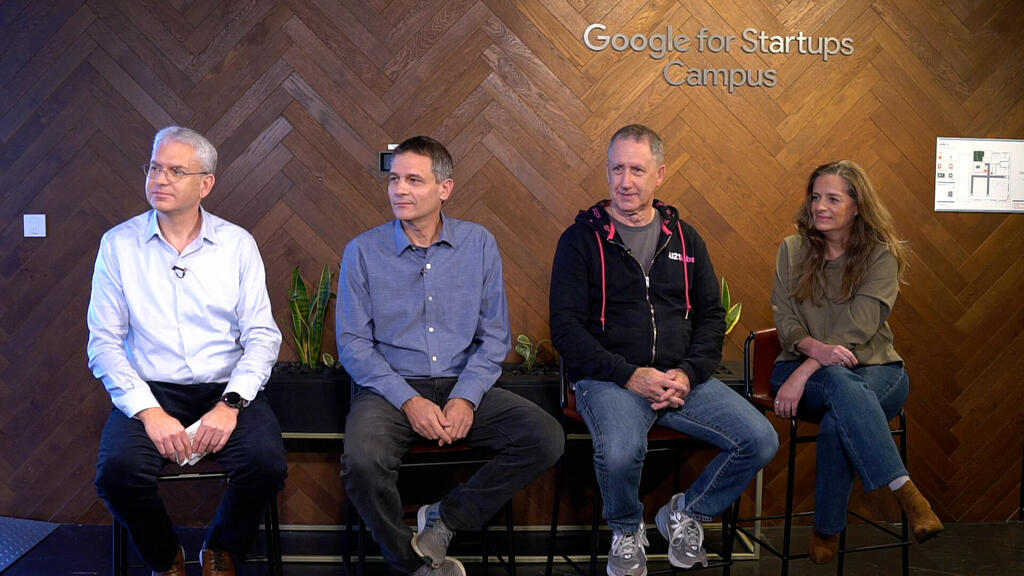
Nvidia Sr. Director of AI Research: "Israel must invest more in AI to reclaim a leadership position in this field"
Prof. Gal Chechik was speaking on a panel with Prof. Yoav Shoham, founder and co-CEO of AI21, Noa Elefant Loffler, Director of Government Affairs and Public Policy at Google, and Deputy Attorney General Meir Levin
"While the state is investing, there's a pressing need for more investment. We must invest in research infrastructure, technological personnel training, and AI-focused education across various levels, from schooling to academia. Additional investment is essential for reclaiming a leadership position in this field," said Prof. Gal Chechik, Senior Director of AI Research at Nvidia, during a panel held as part of the fourth day of Google and Calcalist’s Startup Week.
The panel, moderated by Calcalist reporter Omer Kabir, tackled the question of how players involved in AI can conduct themselves responsibly in a field with minimal regulation. Also participating in the panel were Prof. Yoav Shoham, founder and co-CEO of AI21, Noa Elefant Loffler, Director of Government Affairs and Public Policy at Google, and attorney Meir Levin, Deputy Attorney General.
1 View gallery


Startup Week Panel (from left) Meir Levin, Prof. Gal Chechik, Prof. Yoav Shoham, Noa Elefant Loffler
(Sinai David)
Before delving deeper, where does the industry stand today in the adoption of AI?
Prof. Yoav Shoham: "The industry has made a sharp transition from sporadic experimentation to universal experimentation. While everyone is engaging, these efforts remain largely experimental. Widespread implementations are the next step. 2024 is poised to witness large-scale product launches based on AI. Companies now have a better understanding of AI and its potential applications."
So, are we transitioning from a phase of experimentation to one of wide-scale implementation? How can we ensure a safe transition?
"The key is to enhance AI credibility. If performance is stellar 95% of the time but subpar 5% of the time, it may suffice for homework but falls short for corporate applications. The focus in 2024, as pursued by AI21, will be on developing more precise and dedicated small models, thereby instilling greater confidence in AI."
While technology is crucial, regulation also plays a significant role. What role should it play, especially in Israel?
Noa Elefant Loffler: "The CEO of Google emphasized that artificial intelligence is too important not to be regulated properly. A notable example is the AI Commitment signed by major companies, including Google, following the White House's invitation last year. This commitment prioritizes practical, swift, and transparent regulation."
Turning to Israel, what should our approach to regulation entail?
"Our approach advocates sector-specific regulation tailored to the particular risks in each industry. For instance, AI solutions in the energy sector necessitate insights from the Ministry of Energy. However, regulation is just one facet of the government's AI policy. The state must ensure access to infrastructure and computing power, train personnel, and support the industry."
There's a sentiment that the state isn't investing enough in technological education. Are our investments adequate for nurturing the workforce required for the upcoming revolution?
Prof. Gal Chechik: "While the state is investing, there's a pressing need for more investment. We must invest in research infrastructure, technological personnel training, and AI-focused education across various levels, from schooling to academia. Additional investment is essential for reclaiming a leadership position in this field."
Let's address the government's role in balancing innovation with responsible AI development.
Attorney Meir Levin: "Taking Britain in 1865 as an example, overregulation can stifle innovation. We aim for innovation while managing risks. Horizontal regulation, as in the EU, or sectoral regulation, each with its unique applications and risks, is a crucial choice. Sectoral regulation, involving mapping uses and risks by sector-specific regulators, is recommended."
There's often a perception that regulators are disconnected from technology. Is this stereotype accurate?
Prof. Gal Chechik: "My impression is that the Israeli regulator is more agile than its counterparts worldwide, issuing useful opinions. Regulation in Israel is intertwined with regulations from major bodies like the U.S. and the EU, making it a complex process."
What are your predictions for innovations in Generative AI in the upcoming year?
Prof. Gal Chechik: "One promising direction is the creation of 3D worlds for simulation. These simulations, including physical movement and behavior, enable planning for various environments, from factories to homes. Another significant application is in gaming, where characters exhibit more natural behavior. Additionally, we anticipate creative AI innovations in biology, pharmacology, and medicine, facilitating drug development and testing through simulation."
Prof. Yoav Shoham: "In 2024, we anticipate accelerated developments in small, dedicated models and agent-based systems. These AI systems will tackle complex problems, necessitating decomposition and movement between different stages."
Noa Elefant Loffler: "Consumer engagement with AI is expected to increase in 2024, reflecting growing optimism about AI's significance."
Attorney Meir Levin: "For widespread AI adoption, consumers must trust the product's security. Regulation and law are essential for instilling confidence in these systems."













